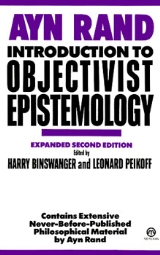
Introduction to Objectivist Epistemology
Encyclopedia
Introduction to Objectivist Epistemology, published in 1979, is Ayn Rand
's essentialised summation of the Objectivist
theory of concept
s and solution to the problem of universals
. The book deals with the mental processes of conceptualization, the nature of definitions, distinguishing legitimate concepts from "anti-concepts," the hierarchical nature of knowledge
, and what constitutes valid axiomatic knowledge. The book also includes an essay by Leonard Peikoff
in which he argues against Immanuel Kant
's theory of analytic propositions and synthetic propositions. These works were originally serialized in The Objectivist from 1966 to 1967, then published in a paperback by The Objectivist in 1967.
The second edition of Introduction to Objectivist Epistemology contains a transcript of Ayn Rand's "Question-and-Answer" session with various professors of philosophy
, mathematics
, and physics
about her epistemology that followed a lecture series she gave on epistemology between 1969 and 1971. Introduction to Objectivist Epistemology describes axiomatic concepts as, "...the identification of a primary fact of reality, which cannot be analyzed, i.e., reduced to other facts or broken into component parts." The three axiomatic concepts identified in Introduction to Objectivist Epistemology are "existence", "identity" and "consciousness".
Ayn Rand
Ayn Rand was a Russian-American novelist, philosopher, playwright, and screenwriter. She is known for her two best-selling novels The Fountainhead and Atlas Shrugged and for developing a philosophical system she called Objectivism....
's essentialised summation of the Objectivist
Objectivism (Ayn Rand)
Objectivism is a philosophy created by the Russian-American philosopher and novelist Ayn Rand . Objectivism holds that reality exists independent of consciousness, that human beings have direct contact with reality through sense perception, that one can attain objective knowledge from perception...
theory of concept
Concept
The word concept is used in ordinary language as well as in almost all academic disciplines. Particularly in philosophy, psychology and cognitive sciences the term is much used and much discussed. WordNet defines concept: "conception, construct ". However, the meaning of the term concept is much...
s and solution to the problem of universals
Problem of universals
The problem of universals is an ancient problem in metaphysics about whether universals exist. Universals are general or abstract qualities, characteristics, properties, kinds or relations, such as being male/female, solid/liquid/gas or a certain colour, that can be predicated of individuals or...
. The book deals with the mental processes of conceptualization, the nature of definitions, distinguishing legitimate concepts from "anti-concepts," the hierarchical nature of knowledge
Knowledge
Knowledge is a familiarity with someone or something unknown, which can include information, facts, descriptions, or skills acquired through experience or education. It can refer to the theoretical or practical understanding of a subject...
, and what constitutes valid axiomatic knowledge. The book also includes an essay by Leonard Peikoff
Leonard Peikoff
Leonard S. Peikoff is a Canadian-American philosopher. He is an author, a leading advocate of Objectivism and the founder of the Ayn Rand Institute. A former professor of philosophy, he was designated by the novelist Ayn Rand as heir to her estate...
in which he argues against Immanuel Kant
Immanuel Kant
Immanuel Kant was a German philosopher from Königsberg , researching, lecturing and writing on philosophy and anthropology at the end of the 18th Century Enlightenment....
's theory of analytic propositions and synthetic propositions. These works were originally serialized in The Objectivist from 1966 to 1967, then published in a paperback by The Objectivist in 1967.
The second edition of Introduction to Objectivist Epistemology contains a transcript of Ayn Rand's "Question-and-Answer" session with various professors of philosophy
Philosophy
Philosophy is the study of general and fundamental problems, such as those connected with existence, knowledge, values, reason, mind, and language. Philosophy is distinguished from other ways of addressing such problems by its critical, generally systematic approach and its reliance on rational...
, mathematics
Mathematics
Mathematics is the study of quantity, space, structure, and change. Mathematicians seek out patterns and formulate new conjectures. Mathematicians resolve the truth or falsity of conjectures by mathematical proofs, which are arguments sufficient to convince other mathematicians of their validity...
, and physics
Physics
Physics is a natural science that involves the study of matter and its motion through spacetime, along with related concepts such as energy and force. More broadly, it is the general analysis of nature, conducted in order to understand how the universe behaves.Physics is one of the oldest academic...
about her epistemology that followed a lecture series she gave on epistemology between 1969 and 1971. Introduction to Objectivist Epistemology describes axiomatic concepts as, "...the identification of a primary fact of reality, which cannot be analyzed, i.e., reduced to other facts or broken into component parts." The three axiomatic concepts identified in Introduction to Objectivist Epistemology are "existence", "identity" and "consciousness".

